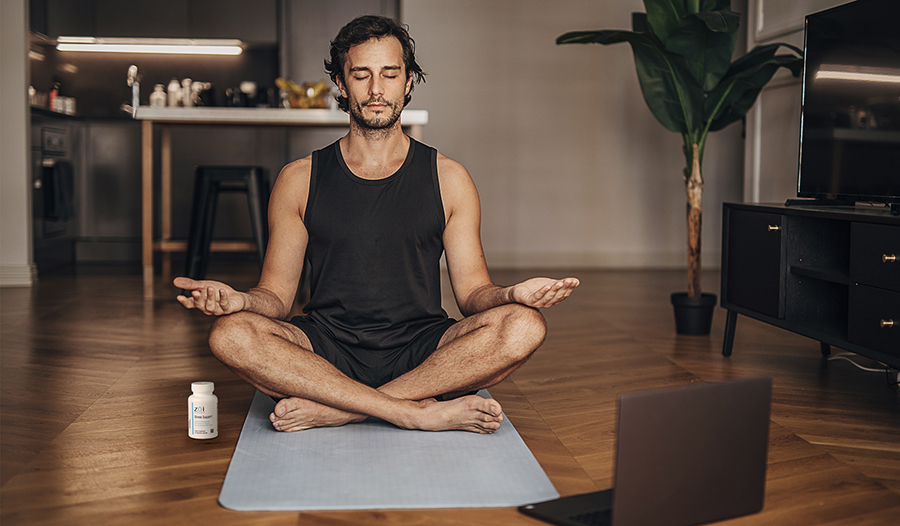3 Healthy Habits to Bring Into 2022, According to a Doctor
DISCLAIMER:This blog does not intend to provide diagnosis...
- In this article:
- Habit Formation
- Get Better Sleep
- Recover After Exercise
- Reduce Stress
- Avoid Excess Alcohol

A new year for many can mean a fresh start. But have you ever made a new year’s resolution and found yourself forgetting about it halfway through the year?
Sometimes making resolutions can feel ineffective because they do not last longer than the first part of the year. This is because habits are behaviors that you need to repeat consistently, so they become effortless and automatic. Think about brushing your teeth before bed. After years of doing this daily task, this habit takes minimal brainpower, with the reward of having a shining, beautiful smile.
This article will review a formula you can keep in your back pocket to help you better understand how to start a new habit and avoid pitfalls. You will find four new habits you can start practicing at any time this new year to help you live a healthier and better life.
Habit Formation
According to the British Journal of General Practice, habits are actions that are triggered automatically due to a behavioral cue that is associated with their performance or reward. Think about washing your hands after using the restroom: the behavioral cue is using the restroom, and the action triggered is washing your hands to prevent an illness: the reward.
As the action is repeated more in relation to a consistent cue, your brain will depend less and less on conscious attention or a motivational process. This will allow the habit to persist even after the motivation or the interest disappears. Think about how many times you have been too tired to brush your teeth, yet you still manage to do it before bed. Therefore, a good habit is cognitively efficient, meaning it frees up the mental capacity for your brain to focus on other tasks.
Habits with immediate rewards are easier to pick up, while those with a delayed reward, such as losing weight, are more difficult to commit to a maintain. An easy three-step formula to remember when making a new habit is to start with the habit you would like to change. Then start to think about what will be the cue that your brain will use to jumpstart you into that habit loop. Then think about a routine, a behavior you will do, or the action that will lead you to the goal or reward—this will be your new habit. So let's get started!
Get Better Sleep
Sleep is a pivotal part of our day, and there is extensive evidence of the many sleep benefits. These include improved synaptic plasticity, which may help form memories and retain information better, emotional regulation, and metabolism. While you sleep, your body is also going through a type of reset, where metabolic waste is being removed. Having good sleep hygiene is pivotal to getting optimal sleep. Good sleep hygiene can be one of the most beneficial habits you can create to help you live a healthier 2022.
According to the Centers for Disease Control and Prevention (CDC), some of the tips to include in your bedtime routine for better sleep include consistency, going to bed at the same time each night, and having the same wake-up time, including on the weekends. Be sure your bedroom is quiet, relaxing, and dark. Avoid screens, including cell phones and television, one hour before sleeping. Also avoid large meals, caffeine, and alcohol before bedtime. These substances have been shown to decrease your sleep quality. One easy addition to this new routine is a melatonin supplement.
Melatonin is a natural hormone made in the brain during nighttime or when dark. It helps regulate the body’s sleep-wake cycle. This hormone informs the body that it is time for sleep and will promote a consistent quality night’s rest.
According to the Sleep Foundation, for people who have trouble falling asleep, suffer from jet lag, or have erratic work schedules, taking melatonin may help facilitate your body’s transition to sleep and promote better sleep quality. Although there is inconsistent evidence of the benefits of melatonin in healthy individuals or in those who wake up in the middle of the night, given the safety efficacy of this supplement, melatonin may still be a great addition to your new routine for your goal of better sleep.
Recover After Exercise
Perhaps your new habit for the new year is being more active by running a 5K, half-marathon, marathon, or even a triathlon. Maybe you want to lead a more active lifestyle, but find yourself lacking motivation, not having enough time, thinking it is boring, being too tired, or being afraid of hurting yourself. Although these may be valid reasons, you still have many options to stay active and achieve your fitness goals for 2022. One of the most important routines to establish in your goal for a healthier fit new year is recovering after exercising.
According to a review by Hotfiel et al, the soreness that many feel after exercise, termed delayed onset muscle soreness (DOMS), starts 6–12 hours post-exercise and peaks at 48–72 hours. Some characteristics of DOMS include muscle soreness and reduced range of motion at the joints. This is different from serious muscle pain or joint pain, which may be present before or after exercise and may not resolve with rest.
Electrolyte imbalances are associated with DOMS, especially after extraneous activities. Thus, staying hydrated and adding your favorite flavored electrolyte supplement will not only help you stay hydrated, but it will also help prevent electrolyte imbalances that may then lead to further muscle soreness.
Additionally, you can supplement your post-workout drink with branch chain amino acids, which may help reduce the degree of muscle soreness related to muscle damage from exercise. Heat therapy has also shown that it may help reduce the inflammation associated with muscle soreness and, thus, improve the range of motion at the joints. Finally, after undertaking a new exercise routine, take the time to engage in active recovery by going for a walk, stretching, or practicing yoga, which will help open the joints and keep your muscles active to help clear metabolites that have accumulated with muscle soreness.
Reduce Stress
Having a calmer 2022 may be on your to-do list. The past couple of years have been highly stressful for many people, and having too much stress can be harmful not only to your body but to your mental well-being. Staying active releases endorphins that help maintain your mood steadier during stressful moments.
A study conducted by Childs and de Wit at the University of Chicago on 111 participants 18–32 years of age found that those who engaged in a minimum of 1 day per week of exercise had better emotional resiliency when undertaking stressful tasks. Heart rate and cortisol levels didn’t change, which indicates that the body still reacted the same way to stress situations in those that did and did not exercise. But the outlook and emotions elicited did vary, indicating that staying active with some form of exercise may help maintain a positive mood and outlook on life. A small experimental study showed that even small exercises like yoga have been shown to help reduce stress and help with mood, especially if you have chronic conditions.
In addition to reducing your stress by engaging in exercise, adding lavender as aromatherapy and as an oil extract in supplements may help reduce your stress. Lavender oil has been shown to have calming properties and can be taken as a part of a daily regimen when you start the day, or at the end of the day to get restful sleep and destress with melatonin as you prepare for bed.
Avoid Excess Alcohol
Although past studies showed that moderate alcohol consumption had protective health benefits, recent studies reported by the CDC show this may not be true. Even alcohol consumption within the recommended limits—2 drinks per day for men and 1 drink per day for women—may increase the overall risk of unhealthy outcomes.
While the holidays are filled with festivities, consider reducing your alcohol intake to live a healthier 2022. This will help you achieve better sleep, reduce stress, improve your overall health, and even help you in maintaining your exercise routine. A study in the Journal of General Internal Medicine showed that outpatient alcohol drinkers who sustained a reduction in alcohol consumption report modestly improved quality of life and fewer alcohol-related adverse consequences when compared to drinkers who did not reduce their daily intake.
In the new year, consider what new habits you will incorporate to achieve a healthy lifestyle, remember the habit loop: cue, routine, and reward. The tips above can be easily combined into a routine that will help you have a calmer and healthy 2022 with an optimism ready to take on any difficult situation.
References:
- Gardner B, Lally P, Wardle J. Making health habitual: the psychology of ‘habit-formation’ and general practice. Br J Gen Pract. 2012;62(605):664-666. doi:10.3399/bjgp12X659466
- Changing habits. Learning Center. https://learningcenter.unc.edu/tips-and-tools/changing-habits/. Published September 24, 2021. Accessed December 18, 2021.
- Vyazovskiy VV. Sleep, recovery, and metaregulation: explaining the benefits of sleep. Nat Sci Sleep. 2015;7:171-184. Published 2015 Dec 17. doi:10.2147/NSS.S54036
- CDC - sleep hygiene tips - sleep and sleep disorders. Centers for Disease Control and Prevention. https://www.cdc.gov/sleep/about_sleep/sleep_hygiene.html. Published July 15, 2016. Accessed December 18, 2021.
- Melatonin and sleep. Sleep Foundation. https://www.sleepfoundation.org/melatonin. Published November 22, 2021. Accessed December 18, 2021.
- 10 fitness barriers you can overcome. Mayo Clinic. https://www.mayoclinic.org/healthy-lifestyle/fitness/in-depth/fitness/art-20045099. Published October 16, 2019. Accessed December 20, 2021.
- Hotfiel T, Mayer I, Huettel M, et al. accelerating recovery from exercise-induced muscle injuries in triathletes: considerations for Olympic distance races. Sports (Basel). 2019;7(6):143. Published 2019 Jun 13. doi:10.3390/sports7060143
- Childs E, de Wit H. Regular exercise is associated with emotional resilience to acute stress in healthy adults. Front Physiol. 2014;5:161. Published 2014 May 1. doi:10.3389/fphys.2014.00161
- Shohani M, Badfar G, Nasirkandy MP, et al. The effect of yoga on stress, anxiety, and depression in women. Int J Prev Med. 2018;9:21. Published 2018 Feb 21. doi:10.4103/ijpvm.IJPVM_242_16
- Malcolm BJ, Tallian K. Essential oil of lavender in anxiety disorders: Ready for prime time?. Ment Health Clin. 2018;7(4):147-155. Published 2018 Mar 26. doi:10.9740/mhc.2017.07.147
- Facts about moderate drinking. Centers for Disease Control and Prevention. https://www.cdc.gov/alcohol/fact-sheets/moderate-drinking.htm. Published December 29, 2020. Accessed December 18, 2021.
- Kraemer KL, Maisto SA, Conigliaro J, McNeil M, Gordon AJ, Kelley ME. Decreased alcohol consumption in outpatient drinkers is associated with improved quality of life and fewer alcohol-related consequences. J Gen Intern Med. 2002;17(5):382-386. doi:10.1046/j.1525-1497.2002.10613.x

 By Dr. Gabriel Espinoza, M.D.
By Dr. Gabriel Espinoza, M.D.


